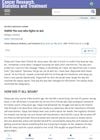 19 citations,
June 2020 in “International Journal of Dermatology”
19 citations,
June 2020 in “International Journal of Dermatology” Low-dose oral minoxidil effectively treats non-scarring hair loss with some side effects like hypertrichosis and postural hypotension.
 341 citations,
November 2009 in “The FASEB Journal”
341 citations,
November 2009 in “The FASEB Journal” Calreticulin has roles in healing, immune response, and disease beyond its known functions in the endoplasmic reticulum.
 71 citations,
May 2007 in “The FASEB journal”
71 citations,
May 2007 in “The FASEB journal” Human hair follicles produce and respond to erythropoietin, helping protect against stress.
 31 citations,
January 2015 in “Journal of The American Academy of Dermatology”
31 citations,
January 2015 in “Journal of The American Academy of Dermatology” Prostaglandin F2α analogs show promise for treating certain types of hair loss but need more research for other skin conditions.
 30 citations,
April 2017 in “European Journal of Cell Biology”
30 citations,
April 2017 in “European Journal of Cell Biology” CIP/KIP proteins help stop cell division and support hair growth.
 26 citations,
January 2013 in “BioMed Research International”
26 citations,
January 2013 in “BioMed Research International” Hormonal changes after childbirth and menopause can lead to women's hair loss and facial hair growth, with a need for better treatments.
 17 citations,
April 2006 in “Dermatologic Clinics”
17 citations,
April 2006 in “Dermatologic Clinics” Older women face various skin issues like dryness and thinning, and treatments are available but can have side effects; proper skin care and legal health decisions are important.
 10 citations,
May 2018 in “Neuropharmacology”
10 citations,
May 2018 in “Neuropharmacology” Drugs for hormone-related conditions might help treat mental disorders but could have serious side effects.
 10 citations,
October 2015 in “Medicina Clínica (english Edition)”
10 citations,
October 2015 in “Medicina Clínica (english Edition)” Recombinant human epidermal growth factor is versatile, effective, and safe for long-term skin and mucosal treatments.
 8 citations,
January 2017 in “Fertility and Sterility”
8 citations,
January 2017 in “Fertility and Sterility” Urologic diseases and treatments in older men can negatively affect fertility, and doctors should talk to patients about this.
 6 citations,
December 2010 in “Case Reports”
6 citations,
December 2010 in “Case Reports” A woman with high testosterone and an adrenal nodule had an ovarian tumor causing her symptoms, which improved after the tumor was removed.
 3 citations,
June 2004 in “Alternative and Complementary Therapies”
3 citations,
June 2004 in “Alternative and Complementary Therapies” The document concludes that hair loss is influenced by genetics and other factors, and while treatments like finasteride can help, they have limitations and side effects.
 1 citations,
January 2024 in “Curēus”
1 citations,
January 2024 in “Curēus” Clinicians should use social and prescription data to track trends in performance-enhancing drug use.

The document concludes that non-endocrine alopecia in pets varies in treatment effectiveness and often has a poor prognosis, especially in cats.
 159 citations,
July 2006 in “Endocrine Reviews”
159 citations,
July 2006 in “Endocrine Reviews” Estrogens significantly influence hair growth by interacting with receptors in hair follicles and may help regulate the hair growth cycle.
 78 citations,
March 2004 in “Annals of Oncology”
78 citations,
March 2004 in “Annals of Oncology” The treatment combining docetaxel, cisplatin, and 5-FU is feasible and effective for advanced head and neck cancer.
52 citations,
May 2011 in “APOPTOSIS” Hydroxyl radicals cause hair follicle cell death during chemotherapy by reducing Bcl-2 protein levels.
 51 citations,
April 1999 in “The Journal of Steroid Biochemistry and Molecular Biology”
51 citations,
April 1999 in “The Journal of Steroid Biochemistry and Molecular Biology” Testosterone replacement may improve sexual desire and bone health in women with low androgen levels, but more research is needed on its long-term safety.
 46 citations,
February 2012 in “Oncology Reports”
46 citations,
February 2012 in “Oncology Reports” Sorafenib helps some advanced cancers alone or with other treatments, but not all, and research continues to improve its use.
 26 citations,
October 2014 in “Andrologia”
26 citations,
October 2014 in “Andrologia” Infertile men are more likely to produce sperm with abnormal chromosome numbers, which can affect pregnancy success and embryo health.
 24 citations,
July 1987 in “Dermatologic Clinics”
24 citations,
July 1987 in “Dermatologic Clinics” Systemic diseases can cause hair loss, which is often reversible with treatment.
 14 citations,
January 2008 in “Gene therapy”
14 citations,
January 2008 in “Gene therapy” Gene therapy shows promise for enhancing physical traits but faces ethical, safety, and regulatory challenges.
 13 citations,
August 1980 in “Cancer”
13 citations,
August 1980 in “Cancer” Multimodal primary treatment improves survival in premenopausal breast cancer patients and is also beneficial for postmenopausal women.
 3 citations,
March 2018 in “European Urology Supplements”
3 citations,
March 2018 in “European Urology Supplements” Using 5-alpha-reductase inhibitors may improve bladder cancer survival in men.
 3 citations,
October 1982 in “Postgraduate Medicine”
3 citations,
October 1982 in “Postgraduate Medicine” Most types of hair loss can regrow naturally, but there are no effective cures for male pattern or age-related hair loss, and only limited options for females.
 3 citations,
February 1976 in “Pediatric Clinics of North America”
3 citations,
February 1976 in “Pediatric Clinics of North America” The conclusion is that effective cancer treatment often requires a combination of therapies, but must be carefully managed due to serious side effects and the risk of immunosuppression.
 January 2023 in “International journal of homoeopathic sciences”
January 2023 in “International journal of homoeopathic sciences” Homeopathy helped a 30-year-old man regrow his hair.
 January 2023 in “Cancer research, statistics, and treatment/Cancer research, statistics and treatment”
January 2023 in “Cancer research, statistics, and treatment/Cancer research, statistics and treatment” Vijaya successfully fought stage 2A breast cancer with surgery, chemotherapy, radiotherapy, and hormone therapy, while advocating for support groups.

The document is a detailed guide on skin conditions and treatments for dermatologists.

Accurate diagnosis and tailored treatments are crucial for managing hair loss in humans and animals.





























